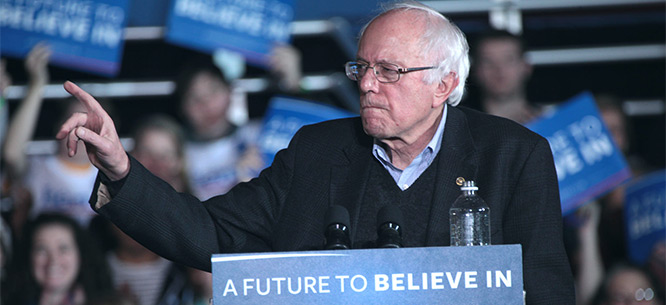What is it about some radicals’ (including this one) problem with the inevitable, the predictable? Given our accurate worldview—the world is run for the rich and powerful, by the rich and powerful—we ought not be perturbed when the rich and powerful do what’s in their perceived interest. Is it because the expected is so loathsome? Could it be we still harbor some jot of hope that right makes might?
The latest example of disgusting normal is the
New York Times’ endorsement of Hillary Clinton—its fourth across the years (twice for US Senate, and for the Democratic nomination in 2008). What makes it so vile is the editorial board’s feigned “confidence and enthusiasm” on behalf of “one of the most broadly and deeply qualified presidential candidates in modern history.”
Clinton’s broad and deep qualifications, and the record she carved while earning them, make up one half of what’s wrong with her as prospective president. The Timescites her Senate experience, her stint as secretary of state, and “her experience on the national stage as first lady with her brilliant and flawed husband, President Bill Clinton,” but says little about her ‘accomplishments’ in these roles.
We learn nothing from the endorsement about her ingrained corruption, her pay to play existence, including service on Wal-Mart and other corporate boards, her repellent speaking fees, or her role in soliciting large foreign contributions for the Clinton Foundation.
The Times breezes past her militarism and jingoism, her readiness to invade anywhere at anytime “but we have no doubt that Mrs. Clinton would use American military power effectively and with infinitely more care and wisdom than any of the leading Republican contenders.” There’s very little, if any, distance between the Republicans and Clinton on defense and foreign policy, including the former’s grotesque promises to kill even more innocents in the War on Terror. Unable to cite a single example of the “effective” use of American military power from the past seventy years, the paper must keep it vague.
The editorial forgets and thus forgives Clinton’s awful record in Haiti, her demonization of Chavez in Venezuela, and her central role in the Honduran coup. Instead, the paper coos, “As secretary of state, Mrs. Clinton worked tirelessly, and with important successes, for the nation’s benefit. She was the secretary President Obama needed and wanted: someone who knew leaders around the world, who brought star power as well as expertise to the table.”
There’s no mention of Clinton’s support for nuclear weapons modernization or her critical role in ginning up the new cold war with Russia. The paper apologized for its own role in enabling George Bush’s invasion of Iraq; it ignores Hillary’s. As Senator and Secretary of State, Clinton favored force over negotiation at every juncture, but you wouldn’t learn this from the Times endorsement. The paper lauds Clinton’s lecture to Arab leaders to neoliberalize their economies and polities, “before the Arab Spring,” as if she weren’t a personal friend of Hosni Mubarak, who helped him hang on longer—resulting in the deaths of hundreds of nonviolent protesters—than he would have without her and Obama’s support.
The endorsement misses Clinton’s role in spreading lies about Gaddafi regime atrocities, propaganda indispensable for NATO’s campaign of regime change. We’re not reminded of her cold-blooded quip—“We came, we saw, he died”—upon the occasion of the despot’s murder at the hands of a street mob. The horrors of post-Gaddafi Libya are conveniently ignored.
The Times acknowledges that “certainly, the Israeli-Palestinian crisis deepened during her tenure,” but quickly adds, “she did not cause that.” Not singlehandedly, of course, but her unwillingness to stand up to Netanyahu, her continued and unwavering defense of Israel in international bodies, and her failure to threaten an aid cut off, surely helped to sustain the occupation.
Clinton’s current policy prescriptions make up the second half of the case for why she’d be at least as bad a president as Barack Obama. Clinton was and is a cheerleader for assassination by drone. She voted for the Patriot Act, and its reauthorization, and remains a supporter of mass surveillance. She’s as vindictive and wrong headed about whistleblowers, including Edward Snowden, as Obama. She’s ready to go to war in Syria, a bridge too far even for the Times: “We are not convinced that a no-fly zone is the right approach in Syria.”
The paper defends Clinton’s proposals for tweaks to the inadequate Dodd-Frank, and lauds her milquetoast proposals for “controls on high-frequency trading and stronger curbs on bank speculation in derivatives” as if they are enough to defend Main Street from Wall Street.
The editorial writers likely cramped up with their stretch defending Hillary’s “pledge to support the well-being and rights of working Americans.” Where was Clinton as labor unions shriveled following sustained attacks from business lobbies, offshoring of manufacturing jobs, and the anti-labor policies of recent presidents including those of “her brilliant and flawed husband”? Seen her at a Fight for $15 rally? Opportunistic labor leaders may endorse Hillary, but the rank and file is hardly enthused.
Like the candidate herself, the Times highlights her feminist icon status, as if reproductive rights and verbal support for equal pay were all American women need.The paper is satisfied by her underwhelming proposals for paid family leave, child care and work schedule stabilization. The contradictions between her brand of feminism and the substance of her corporate Democrat economic policies—including eager backing for “free trade agreements”—go unaddressed. The Times explains her recent reversal on the Trans-Pacific Partnership, a corporate domination scheme for which she robustly campaigned as Secretary of State, as “a refreshing willingness to learn.”
The editorial finds in Clinton a “steeliness that will serve her well in negotiating with a difficult Congress on critically important issues like climate change.” It ignores that she waited to oppose the Keystone XL pipeline until it was going down to defeat. There’s nothing about her years-long sales pitch for fracking overseas. The deluge of oil money flowing to the Clinton Foundation is skipped. Her support for offshore drilling and lack of leadership on climate change go unraised. At best, Hillary Clinton’s energy and environmental policies would look like Barack Obama’s third term. At worst, they’d look like Bill Clinton’s.
The Times case against Bernie is the same thin gruel dished up by the Washington Post, and the growing chorus of liberal attacks on the Vermonter as he catches on with publics in early primary states. He lacks experience (after serving as a mayor, member of Congress, and US Senator), exhibits insufficient “breadth of policy ideas” (while his program puts everybody but Jill Stein’s to shame), and lacks realism (the editorial flags his calls for dismantling too big to fail banks and for Medicare for All).
Like the Clinton campaign, the editorial writers gun control-bait a guy with a D- rating from the NRA, and suggest Hillary is the better women’s advocate because she came out against the Hyde Amendment before Sanders did.
The Times apparently believes Hillary is more electable than Bernie, despite polls showing that Sanders matches up as well against the Republican field as does Clinton. The timing of the endorsement is telling, coming right before the Iowa caucuses (just like its endorsement of Clinton in 2008). The editorial board must be nervous that someone besides their preferred candidate wins in Iowa, again.



